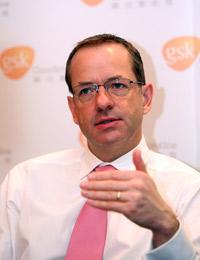
Andrew Witty
British drugmaker GlaxoSmithKline (GSK) Plc is planning to move part of its flu drug Relenza manufacture to China to better support the local market."I hope that we will be able to shift some Relenza manufacture to China to make our products more accessible in the country," said Chief Executive Andrew Witty.
The drug, which received the State Food and Drug Administration (SFDA) approval in September for domestic sales, is used to fight the flu virus along with Roche's Tamiflu.
Welcoming the Chinese government's speedy approval for Relenza in the country, Witty said GSK is the only firm that produces both vaccines and drugs to tackle H1N1 flu.
GSK has adopted a three-pronged strategy to tackle the epidemic, said Witty. Apart from producing the vaccine, the company is also making anti-viral face-masks, and anti-viral medicines such as Relenza.
The company plans to ship nearly 450-500 million doses of its anti-H1N1 flu vaccine and sell 60 million packs of Relenza globally from this quarter to next year.
The CEO said GSK's joint venture with a Shenzhen-based pharmaceutical firm would "help bring more of GSK's technologies to China".
GSK inked a deal with Shenzhen Neptunus Interlong Bio-tech in early June to develop flu vaccines for the Chinese market and invested $35.3 million for a 40 percent stake in the new venture.
"The joint venture with Neptunus, which focuses on flu vaccines will hopefully in the future create greater domestic capability," he said.
GSK also signed a deal with Yunnan Walvax Biotech in October to co-launch a company that focuses on vaccines for kids, with an initial investment of 451 million yuan from the two companies.
Witty said the company is now putting more emphasis on its vaccine and consumer goods businesses and focusing on emerging markets like China, Brazil and Russia.
"We have a leadership position in vaccine and consumer products. What I want to do is to build these two businesses so that the three main arms of pharmaceuticals, vaccines and consumer goods, can complement each other. That way we would be able to mitigate our risks and deliver consistent and sustainable growth," he said.
Emerging markets like China offer immense potential for growth due to the rapid development of the healthcare sector, he said.
"It's an easy decision to prioritize here as I've spent most part of career in emerging markets like Asia and Africa," said Witty.
The company is enhancing its investment in China by increasing the amount of R&D investment and employing more people to work with hospitals, apart from forging partnerships with local companies, he said.
"In reality, for GSK, the center of gravity is moving to the east."
GSK has so far invested $400 million and has around 4,000 employees in China.





